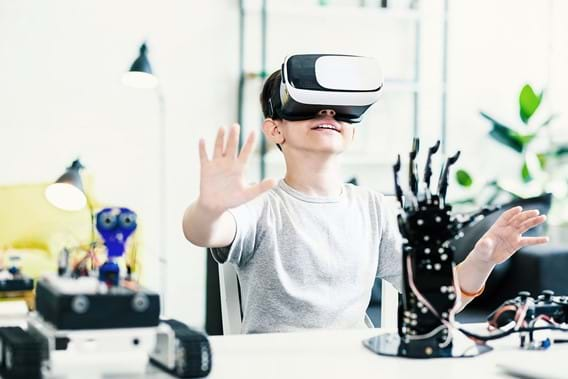
The Alpha Generation: The Educated Offspring of the Y Generation

Written by: Carol Allain
If you were born between 1980 and 2010, you belong to Generation Y or Generation Z. That’s right: every generation gets a label! The next cohort is Generation Alpha, for children born between 2010 and 2025. What will their future look like? How are they different? And how will the world around them change? This article covers the basics.
Who are the Alphas?
The latest generation was named early in the game by Australian social researcher Mark McCrindle. And the labelling continues: the Alphas are set to be followed by the Betas—the moniker slated for those born between 2025 and 2039.
Every week, more than 2.8 million Alphas are born. One in seven people on the planet is a member of the Alpha Generation. By 2025, there will be more than 2.2 billion of them. One of their defining characteristics, the impact of which has yet to be felt, is an astounding degree of diversity. Demographic data shows a marked rise in ethnic diversity in places like the United States.
According to a 2018 McCann Worldgroup Canada study, 63% of Alpha children are or will be born to Y parents (1980–1995). The oldest Alpha children are currently 10 (born in 2011) and the youngest haven’t been born yet.
What defines Alphas?
For now, the best we can do is sketch an outline and come up with hypotheses. Like Generation Z, Alphas are children of the digital age. They’re seen on 3D ultrasound screens before they’re even born and come into a highly technological world. They’re surrounded by screens, tablets, computers, virtual reality glasses, and video games that have them gleefully absorbed, sometimes even before they’ve learned to talk.
Screens have replaced keyboards as the primary interface, which is why Alphas have been called “Generation Glass.” In Quebec, the impact of digital culture and ever-increasing screen time on mental health is a source of concern. In an article published in La Presse (October 25, 2019), Dr. Karina Igartua, president of Quebec’s association of psychiatrist physicians and founder of the Alphas connectés (“online Alphas”) movement, sounded the alarm, saying “Screen time cuts into sleep time, makes young people less likely to be physically active, and reduces their social interactions—three factors that increase the risk of suffering from mental health issues.” In Quebec, a third of young people are in a state of mental distress. Mental health issues are on a relentless upward trajectory, and anxiety disorders have doubled over the past six years.
Little Alphas are growing up in a world of rapid transformation. Family models have exploded: from traditional families to single parents to same-sex couples, transgendered parents, and blended (step) families, everything is possible. Alphas may even see the end of gender identity. Through their parents, many Alphas will experience instability on various levels (housing, employment, finances), which should foster a strong ability to adapt.
Highly educated and moneyed
Alphas are set to be the most formally educated, the most connected, and globally the wealthiest generation ever. Even more than Gen Z, Alphas are Googling and seeking out information on all kinds of things from a very early age. Their screens have become a learning tool, giving them access to an incredible amount of information from the comfort of their own homes. Odds are that Alphas will be as fun-loving, intuitive, and creative as Generation Z, furthering the technological developments of the previous generation. Their parents will need to invest in them from an early age to secure their academic futures.
This early access to information will change their relationship with knowledge and learning, which will undoubtedly be more utilitarian and opportunistic. At least that’s the theory advanced by sociologist Rémy Oudghiri in his book on how adults are increasingly behaving like children (Ces adultes qui ne grandiront jamais : petite sociologie des grands enfants (Arkhé, 2017)). Even more pragmatic than Gen Z, Alphas will be looking for solutions to specific problems, like pollution or the loss of planetary biodiversity. They’ll be more independent in their learning processes than previous generations and will want to create their own educational structures beyond the bounds of traditional school. American generational expert Dan Schawbel believes some will have their own businesses by the age of 10, as seen with Gen Z.
These initial observations make it clear that nothing will be the same as before for this generation in the making. Which raises some important questions:
- What will happen to schools and universities? Many Gen Zers are already calling for a total system overhaul.
- Will online learning become the norm, with teachers broadcasting from the classroom and with various possible class schedules? And if so, will it revolutionize how we organize our lives?
- Will Alphas need to learn to drive, given the impending era of the self-driving car?
- How will physical activity fit into their lives?
- Will they learn foreign languages or will the growing number and sophistication of smart translation tools do away with the need? What of the many applications designed to help users learn new languages in record time, for free?
- Will they still make meals or will their household tasks be handled by robots?
- Will apps for ordering things online come under greater scrutiny, if only for their illegal uses?
Where do the parents fit in?
On a human level, there’s the matter of the role parents will play, about future approaches to parenting. Will we see an emphasis on the individual—the “I want it, I get it” attitude—or will we see a focus on taking care of others, on giving and sharing? In my own books and talks, I stress how learning about the world and learning to be in the world are both crucial to the way personalities develop; how knowing how to say things and being polite are essential skills.
Parents of the Alpha Generation will need to break away from, or let go of, their identities as consumers. The real downside of the “Me first” attitude that characterizes Gens Y and Z can be seen in their lack of collective spirit, their mistrust of progress, and their reluctance to accept limits and constraints.
Forgotten values worth remembering
In such a world, it will be imperative for new parents to make possible a return, if only partial, to “old-fashioned” values such as commitment, loyalty, sacrifice, and duty. We’ll need to find a new balance between vertical values (belonging, duty, commitment, loyalty) and horizontal values (egalitarianism, autonomy, community, collaboration).
Ideally, Alphas will learn to express themselves in a variety of ways—through speech, music, writing, or with their hands—without always having to depend on technology. Learning slowly but surely, with a pen, paper, paint brushes, or a musical instrument. Playing sports or simply getting outside. Leaving their screens behind. Disconnecting. The ability to take a step back from the moment—something the slower process of maturing allows—is essential.
Alphas will need to fight or submit to the sole imperative of neoliberalism: outcompete all others. As you can imagine, when people are told to look out for themselves, to take care of themselves but not others, that has a real impact on how they view the common good. The neoliberal promise is one of freedom, but a freedom where individuals come to view themselves solely as human capital to be managed as skillfully as possible.
Alphas called on to redefine our role as humans
Like Generation Z before them, Alphas will need to make the survival of the planet a primary concern. They’ll need to find solutions to climate change and to the loss of biodiversity by changing their own habits and behaviours and putting pressure on governments to pass more stringent environmental laws.
Alphas will likely have the same sense of urgency regarding machine intelligence, which is growing at an exponential pace and already defies human intelligence. To fight human obsolescence, Alphas will need to forego alarmist rhetoric and be proactive about putting legal limits on artificial intelligence. They will also need to find the words and means to protect the personal data collected by machines and rewrite the laws that currently apply. But above all else, they’ll be called on to rethink and redefine the very role humans play on our planet. COVID-19 is itself a global catastrophe that requires us to rethink our ways of doing and being, individually and collectively. Future generations will need to rally around a mission of caring…
In the meantime, we’ll need to give Alphas the space to act their age, use their imaginations, explore grey areas, and make mistakes. Let’s talk to them instead of texting. Let’s set clearly defined times for using tablets and smartphones. Let’s offer them books and toys instead. And most important, let’s give them the chance to be bored now and again, off in their own little worlds. Let’s not make our children adults before their time. That’s where the magic lies: in the space we carve out for dreams, for innocence, for being carefree, and for all the questions that are awakened when we do.


